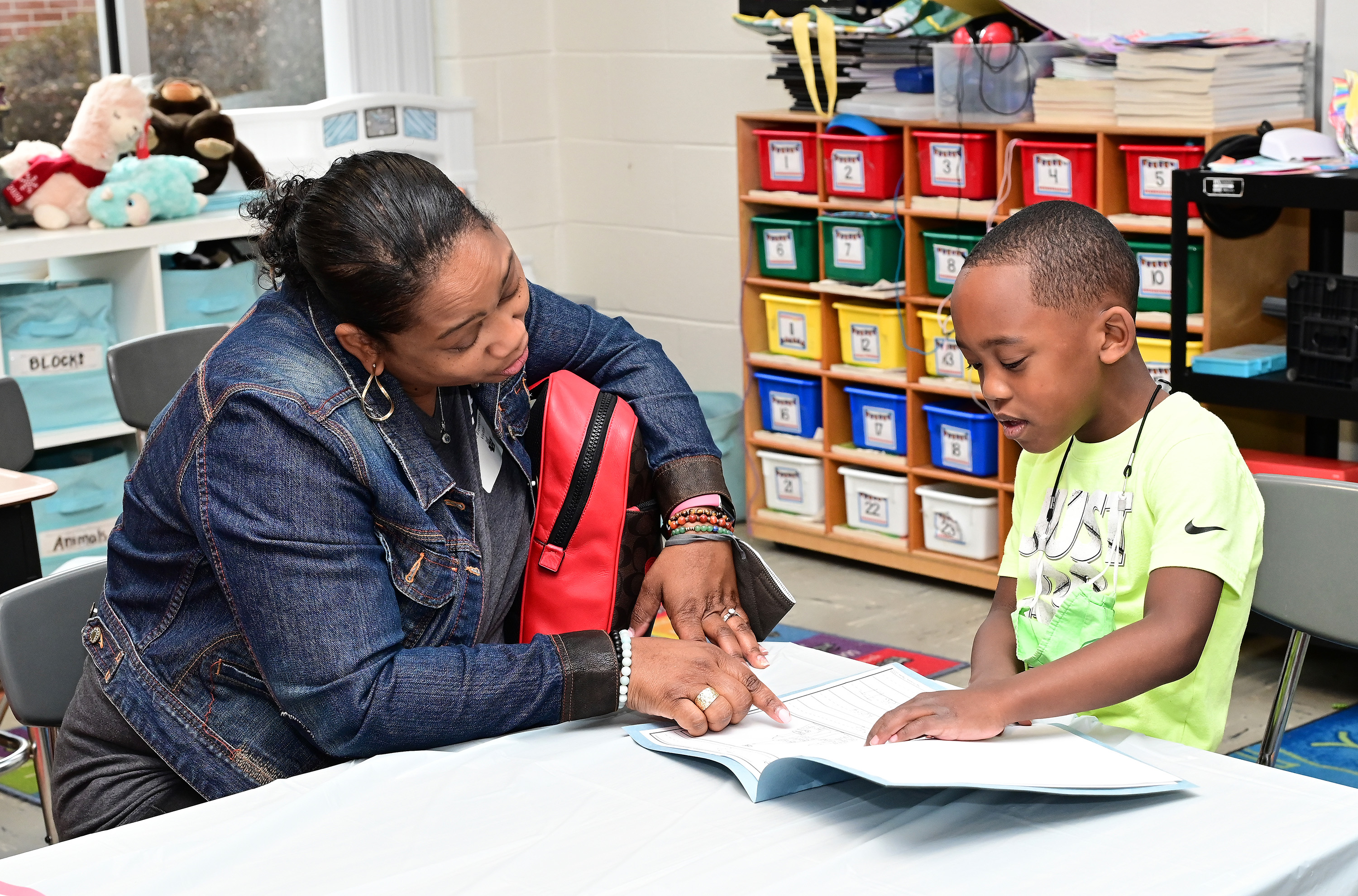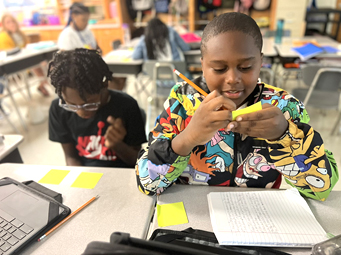
8 minute read
EXCEPTIONAL EXPRESSION | Building a Community of Powerful Readers and Writers
What goes together better than peanut butter and jelly? Better than salt and pepper? Better than macaroni and cheese?
Reading and writing. These two essential and intertwined literacy practices, when cultivated simultaneously, prepare students to not only interpret information they access, but also use their voices to construct texts that share knowledge and new ideas.
Henry County’s families and community leaders understand the importance of reading and writing so much so that the first two tactics of the Community-Inspired Strategic Plan's Strategic Action 1 call for the development and implementation of a research-based reading and writing model, along with aligned professional learning to support teachers in implementing effective reading and writing instruction.
The goal is to build a community of powerful readers and writers who are prepared to use these skills to be the leaders and innovators of the future.

Writing Instruction
Dr. Crystal Williams, assistant principal at McDonough High School, began last year on a mission to increase student achievement beyond the American Literature Milestones and strengthening students’ reading and writing.
Yet the question remained: how to tackle both of these critical and related literacy skills. She noted that teachers tended to start a unit focused on new reading standards, with a transition to writing instruction toward the end of a unit.
Based on a writing instruction “best practice” learned at a Professional Development experience and shared by Instructional and Personalized Learning Lead Alison Beecher, Dr. Williams began to rethink this approach. What followed was school-based professional learning and then classroom-level instructional coaching and collaborative planning support focused on the idea of incorporating explicit writing instruction throughout a unit.
Dr. Williams describes the impact of professional learning at her school in two words: quantity and quality.
She effectively changed teaching practices to ensure student writing was taught and monitored across the entire unit, allowing teachers to provide frequent feedback to students while adjusting instruction to clarify misconceptions.
Writing is now a part of both formative and summative assessment in our English Language Arts classes. Teachers are modeling effective writing practices and providing students with opportunities to apply these practices through classwork and formative assessment opportunities throughout the whole unit of instruction.
-Dr. Crystal Williams, Assistant Principal, MHS
Her observation is a clear illustration of the ways in which the Henry County Schools writing model has shifted teacher practice from “assigning writing” as an end-of-unit task to “teaching writing” through explicit instruction – from the simplest to the most complex skill.
Dr. Williams points to an increase in the percentage of students completing written responses on common formative assessments, rather than leaving them blank, but also the observation of students directly applying writing strategies they have been taught to improve the quality of those written responses.

Increasing Connectivity
One of those students who has seen his writing significantly improve is Xavier Hernandez, a rising senior in Cristina Cauthen’s American Literature and Composition class at McDonough High.
When asked how his teacher has helped him to be a better writer, Hernandez shared, “Ms. Cauthen has been very intentional about helping me be more descriptive answering the short response questions.”
Yet, he also speaks about the way his teacher has taken the time to learn who he is as a person and as a writer by incorporating feedback as an essential component of writing instruction.
When I turn in my writing draft or ask her to review some of my writing for specific feedback, Ms. Cauthen motivates me to think critically about questions before she gives me the answer.
-Xavier Hernandez, Student, MHS
Hernandez displayed pride in the confidence he has gained in writing as he approached state testing and prepared for his senior year of high school.
New Resources
Tarita Reeves, fifth-grade teacher at Woodland Elementary School, is not new to teaching, so when it comes to developing good writing prompts – topics that students will be interested in writing about – she has plenty of options from those used in previous years, along with those provided by the district.
But writing instruction, she realized, is not just about good prompts; instead, for students to produce quality writing for any writing prompt, they must first know how to develop and then organize their ideas around a given topic.
Simply put, completing a writing prompt first requires strong writing instruction. In the 2022-2023 school year, Reeves, along with other K-5 teachers in HCS, engaged in writing-focused professional learning and began using new writing resources to support their instruction.
Paired together, these two shifts addressed the what and the how of explicit writing instruction, from the first parts of the writing process – understanding the critical components of specific types of writing, as well as brainstorming and organizing writing – to the final steps of drafting, revising, and editing.
The writing resources and professional learning have completely shifted my students’ mindsets about writing. I have watched them transform from hesitant, reluctant writers into eager, confident, and enthusiastic writers!
-Tarita Reeves, Fifth Grade Teacher, WES

Building a Foundation
Part of the district’s writing model includes a clear and consistent writing process that can be implemented with our youngest Kindergarten writers as well as our most advanced 12th grade writers.
The first component of this writing process is an emphasis on determining the purpose and goal of writing, as well as considering the criteria for success by studying rubrics and exemplar pieces of writing.
Reeves noted the following about Woodland Elementary students’ application of this first part of the writing process: “The main contributing factor to their writing success has been the use of the writing rubrics to guide their writing goals and to be able to provide effective feedback from the teacher, their peers, and from themselves. The rubrics are a powerful tool to use before writing to inform students of where they’re going during writing to ensure they’re on the right track and after writing to determine whether or not they were successful in reaching their destinations. The pervasive use of writing rubrics to guide writing has been a game-changer!”
Students Shine
One of Henry County’s shining student writers is Harper Cafferty from Ola Middle School. This past year, Harper was recognized as the top seventh-grade writer in several prestigious writing competitions, including being named the state winner in the Young Georgia Author’s competition and the regional winner in Griffin RESA’s Literacy Days.
While Harper has always enjoyed writing, especially in the fantasy genre, she reflected on the role her teachers have played in developing her writing skills, “My teachers have helped me a lot! We focused on the format of essays, writing argumentative essays, and different authors. One teacher suggested that the first sentence should be interesting because it helps the reader want to keep reading your writing.”
Further, her advice to other young writers demonstrates what she has learned through experience and through the support of her teachers, “Don’t compare yourself to someone else. Use what you learn in your writing, and your writing will get better. As time goes on, you improve, and you start to figure out what works and what doesn’t.”
Harper’s numerous accolades suggest that with the help of her teachers she has clearly figured out what works for her as a writer.
Additionally, through the development of the Afterschool Enrichment Program’s (ASEP) literacy enrichment block, students have been provided the opportunity to develop their writing skills beyond regular school hours.
In November 2022 and February 2023, afterschool instructors were able to sign up and attend literacy trainings conducted by ASEP Director Cindy Greene that focused on using writing techniques during afterschool hours. The instructors left the workshop with fun and inventive ideas to use during this enrichment time, as well as books to use during the literacy time to promote writing activities.
Smith Barnes Elementary’s and Cotton Indian Elementary’s ASEP programs have incorporated a music writing class, with the assistance of instructor Omorro Hogan. This class allows students to write original songs and add them to music and different beats, which has been a rewarding experience for these students.
Red Oak Elementary’s ASEP program has incorporated feeling journals to help students manage their feelings and emotions during the afternoon.
Other programs have used read-aloud books to engage students to write in creative ways, such as writing their own plays and puppet shows.

Building a Community
Henry County’s community of powerful readers and writers also includes the following students who have excelled in their written work and been recognized as winners in various writing competitions: Naomi Wright (New Hope Elementary), Dera Ezeike (Red Oak Elementary), and Cameron Barnard (Woodland High) were all recently recognized as regional winners of the Young Georgia Authors Competition.
Moreover, Henry Voices added a writing component to the competition this year and three students (Khyli Bailey, Austin Road Elementary; Rianna Carter, Hampton Middle School; Gbemi Olusanya, Woodland High) were chosen from among hundreds of entries to share, through writing, the ways in which they lead in their schools and communities.
As Henry County Schools continues its intentional investment in and emphasis on explicit writing instruction, we look forward to the countless ways in which our students will learn to showcase their knowledge, ideas, and dreams through written communication. Their voices will be shared, heard, and responded to because of the explicit and authentic writing instruction, feedback, and application that characterize their literacy instruction. They will be integral members of a community of powerful readers and writers.


